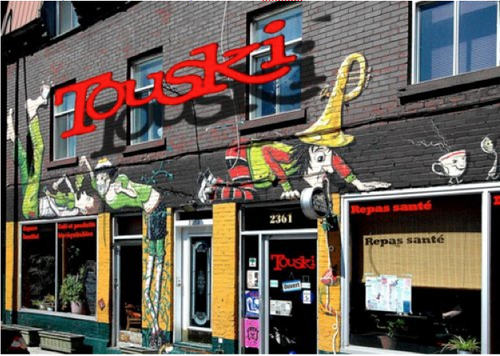Think Local, Try Local
By Echo
 Montréal is a city known for its
cultural diversity, which can be seen from the diverse selection of restaurants
and festivals as well as shopping and clubbing venues. Streets like
St-Catherine, St-Denis, St-Hubert and Mont Royal are most famous to outsiders
for these types of activities, events and places. Unfortunately, many often
limit themselves to these hot spots and therefore miss opportunities to uncover
hidden gems in Montréal.
Montréal is a city known for its
cultural diversity, which can be seen from the diverse selection of restaurants
and festivals as well as shopping and clubbing venues. Streets like
St-Catherine, St-Denis, St-Hubert and Mont Royal are most famous to outsiders
for these types of activities, events and places. Unfortunately, many often
limit themselves to these hot spots and therefore miss opportunities to uncover
hidden gems in Montréal.
A stranger to this city not too long ago, I was determined to discover the core culture in Montréal by finding artifacts that truly belonged to the Québécois culture. One of the gems I found was in an improbable area for the average tourist: the Centre-Sud district.
Historically, the Centre-Sud was an important industrial district during and after the Second World War. Its decline was a result of a mix bag of events such the Révolution Tranquille and Montréal's economic progress focused on the downtown area. As industry players began relocating to better manufacturing real estate, buildings were left abandoned and many became victims of fires. The voids left by these abandoned and empty lots in the community can still be felt. These changes prompted infrastructural and social imbalance. Today, it's an old neighborhood where time has left its mark on the old apartment buildings and the stores at street level. The smell originating from the J.T. McDonald's cigarette factory -one of the last industrial residents- can be overwhelming at times. Recent residential, entrepreneurial and urban developments are slowly rejuvenating this small community. Le Touski, a small work-cooperative café has been acting as a social pillar for this community since 2001.
Le Touski's mission was to provide a healthy alternative to local low-income residents and families. Three single mothers identified this need as streets were becoming plagued with cheap fast-food restaurants by the likes of La Belle Province. The first step to accomplishing this mission was by partnering with local farmers for fresh produce to serve their customers. This encourages local economy and guarantees healthy meals. They also operate as a drop point for Equiterre, an organization whose purpose "helps build a social movement by encouraging individuals, organizations and governments to make ecological and equitable choices, in a spirit of solidarity" (Equiterre Web Site-About). The farmers offer weekly baskets of seasonal produce in exchange for a fee paid at the beginning of the season. This allows the farmer to mitigate some risks linked to agricultural practises and for the individuals to have quality, fair-trade produce.
Today, the mission remains the same, but the breadth of added social value brought by Le Touski to the Centre-Sud community has expanded. It's become a place for people to express themselves. The walls are covered by paintings of local artists. Local musicians, poets and public speakers entertain the customers in the evening. There is a corner dedicated to alternative media whose ideas are frequently marginalized by popular media. They've also partnered with diverse local associations who help the community and some of its residents through social programs.
As a management student, one of Le Touski's most interesting characteristics is its cooperative business model. Each employee is in fact, not an employee but rather a worker. There is no "boss" or "managers" but rather committees. It is in the best interest of the worker to volunteer on these committees as the Café's "financial and entrepreneurial health" is directly related to whether they have a job or not. This creates a collaborative atmosphere and creates a direct correlation the current workforce and its corporate culture. Yet, the norms, values and basic assumptions that maintain Le Touski's identity are consistent.
Today, the terms "sustainability" and "triple bottom line" have become generic. Sadly, its superficial meaning has given way to a new marketing technique for "green" products and services. As a student in management, I had become highly disdained with anyone using these terms for they had no more meaning. Le Touski, however, has integrated these terms as part of their core values. They've looked beyond the environmental aspects and understood that the most important and effective changes any organization can make is within its own community.
These elements concoct a culture that is better defined as a counter-culture. Why? In a country where at least half population elected a right-wing conservative party as the majority government and a very strict version of capitalism marginalizes different ideologies, small businesses of this type are rather rare.
Leave a comment